

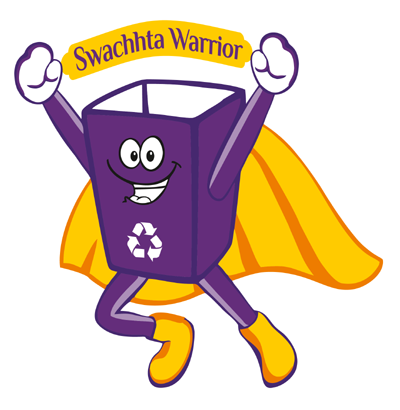
Brochure-Urban Brochure-Rural Videos Bastar Case Study
Project Background
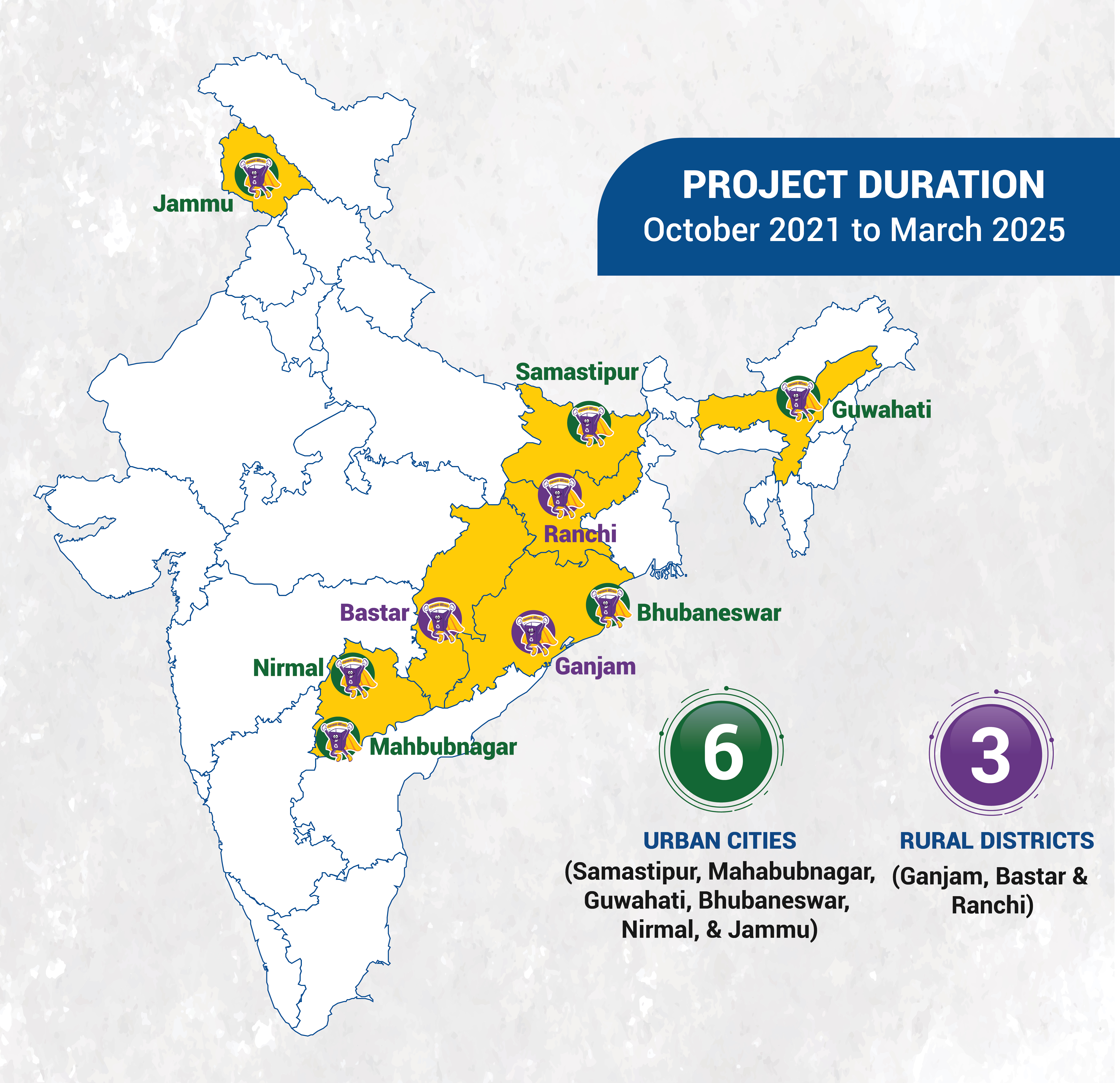 HDFC Bank and Centre for Environment Education (CEE) are implementing a project 'Rural & Urban Landscape Free of Dry & Plastic Waste' in 6 Urban Cities and 3 Rural Districts across India. This initiative is designed to partner in Urban (cities and towns) and Rural (village-panchayat-block-district) areas to synergize the efforts with the Urban/Rural Local Bodies, State Pollution Control Boards, Environment, Forest and Climate Change Department (MoEFCC), Safai Mitras, Service Providers, Recyclers, Swachh Bharat Mission (SBM) and Swachh Survekshan (an initiative of Ministry of Housing and Urban Affairs (MoHUA), Ministry of Jal Shakti (MoJS) & other stakeholders to minimize negative impacts and risks to the environment and the citizen's health. The project desires to encourage all stakeholders in the waste value chain and to promote processes for improving material use efficiency, and a sustainable and safe environment across all forms of dry and plastic waste fractions collection and processing.
HDFC Bank and Centre for Environment Education (CEE) are implementing a project 'Rural & Urban Landscape Free of Dry & Plastic Waste' in 6 Urban Cities and 3 Rural Districts across India. This initiative is designed to partner in Urban (cities and towns) and Rural (village-panchayat-block-district) areas to synergize the efforts with the Urban/Rural Local Bodies, State Pollution Control Boards, Environment, Forest and Climate Change Department (MoEFCC), Safai Mitras, Service Providers, Recyclers, Swachh Bharat Mission (SBM) and Swachh Survekshan (an initiative of Ministry of Housing and Urban Affairs (MoHUA), Ministry of Jal Shakti (MoJS) & other stakeholders to minimize negative impacts and risks to the environment and the citizen's health. The project desires to encourage all stakeholders in the waste value chain and to promote processes for improving material use efficiency, and a sustainable and safe environment across all forms of dry and plastic waste fractions collection and processing.
The project enables approaches and courses by enhancing sustainable non-biodegradable (dry) waste management practices through an interdisciplinary, integrated, multifaceted, and holistic model (segregation, collection, optimizing transportation, processing, sustainable recovery, recycling, and safe disposal) with a strong emphasis on the different elements of circular economy approaches refuse, reduce, reuse, recover, refurbish, and recycle. .
The project’s concept is to encourage all stakeholders in the waste value chain to promote processes and approaches for improving material usage efficiency across all forms of plastic waste segregation and to create a sustainable and safe environment. The project introduced innovative management techniques such as establishing drop-off stations (Plastic Lao-Thaila/Mask Pao) in markets and cities, promoting reverse logistics and efficient vending methods (Reverse Vending Machines), and pushing the development of deposit return systems. More the materials collected at Material Recovery Facilities (MRFs) processed at Material Recycling Centre (MRCs) more carbon emissions checked through recycling and reducing the virgin materials generation. This cyclic approach finally results into meeting climate change commitments. The project is inspired by the Social and Behaviour Change Communication (SBCC) approach that involves the strategic use of communication approaches to encourage changes in knowledge, attitudes, and practices of citizens toward sustainable and environment-friendly behavior. The project also emphasizes on mainstreaming the inclusion of informal sector performers (Safai Mitras; small aggregators and informal recyclers); and amicably figuring out a low-carbon sustainable path ahead with the plastics industry.
Project Vision
The project aims to promote dry waste & plastics recovery and recycling facilities as SWACHH CENTRES. Wherein recovery, recycling, and product making are intertwined in comprehensive spaced area within adequate distances to optimize transportation costs, safety standards, product efficiencies, and better productivity during implementation. The Swachh Centre (MRF & MRC) emphasizes its role in better business decisions with inventory tracking, operational efficiency, material flow analysis, comprehensive planning, and material resource efficiencies. Swachh Centre is a step to reduce carbon emissions, address climate change mitigation, and move to a NET ZERO Circularity approach. The project attentions on 'segregation at source' as once the waste is mixed then it cannot be fixed. Sensitizing all citizens for ownership, to segregate at homes, workplaces, and institutions for a low carbon economy-lifestyle as waste segregated at source is a resource. Recyclables will be segregated through semi-automatic processes at SWACHH CENTRES, which will provide greater livelihoods to marginalized informal waste pickers & small aggregators, and reduce landfills/dumping sites. The project leverages on the Government of India’s notification on Green Credits, RRR Centres, and Lifestyles for Environment (LiFE) Program.
Project Key Components
Project Stakeholders
The figure shows the project’s aims to reach out to a range of stakeholders for a more inclusive approach ensuring more collections of all types of materials.
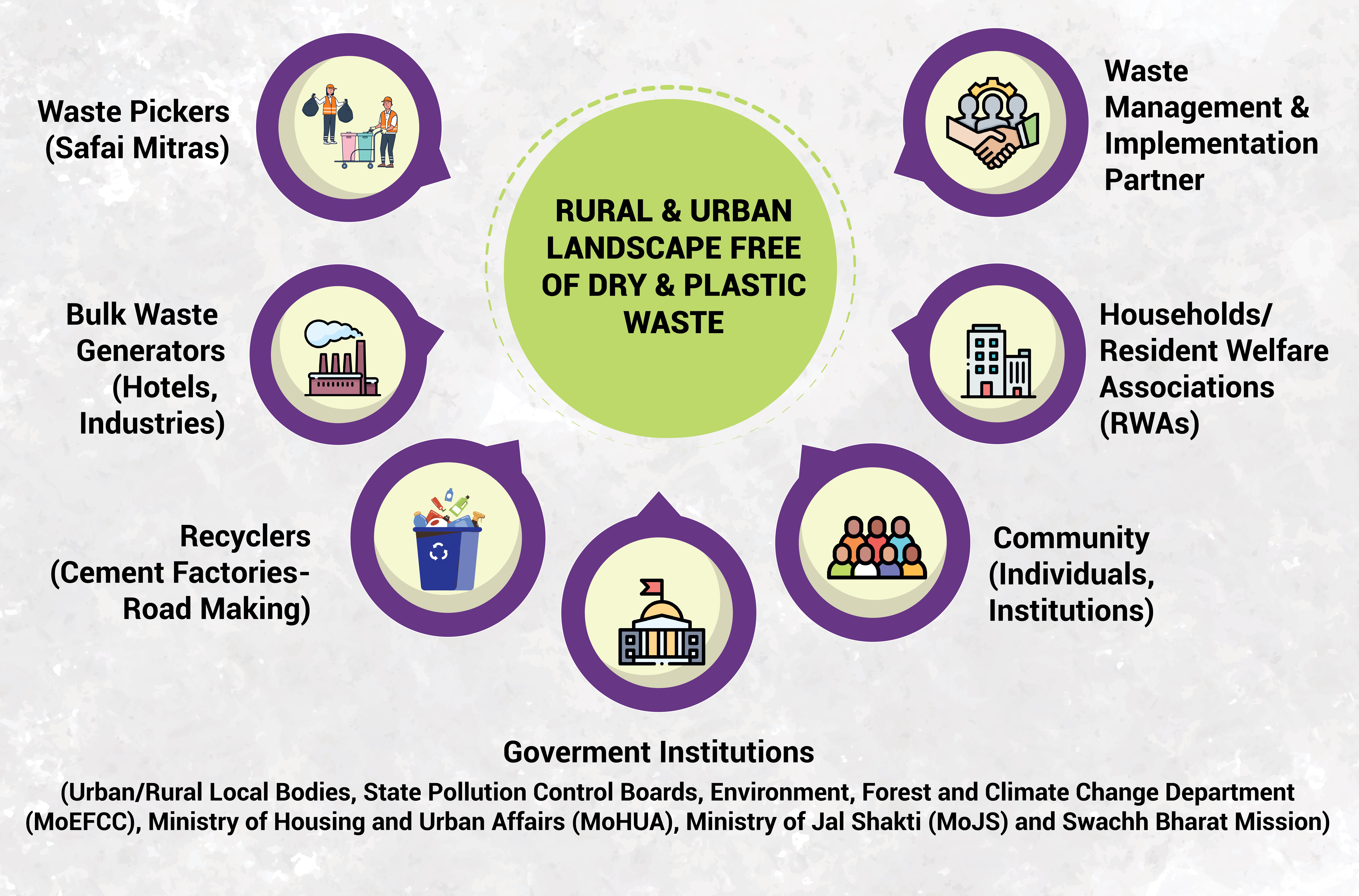
Project Expected Outcomes (within the project duration):
Mainstreaming Sustainable Development Goals
This project contributes to mitigate climate change adversaries by contributing towards 14 of 17 Sustainable Development Goals (SDGs) of United Nations
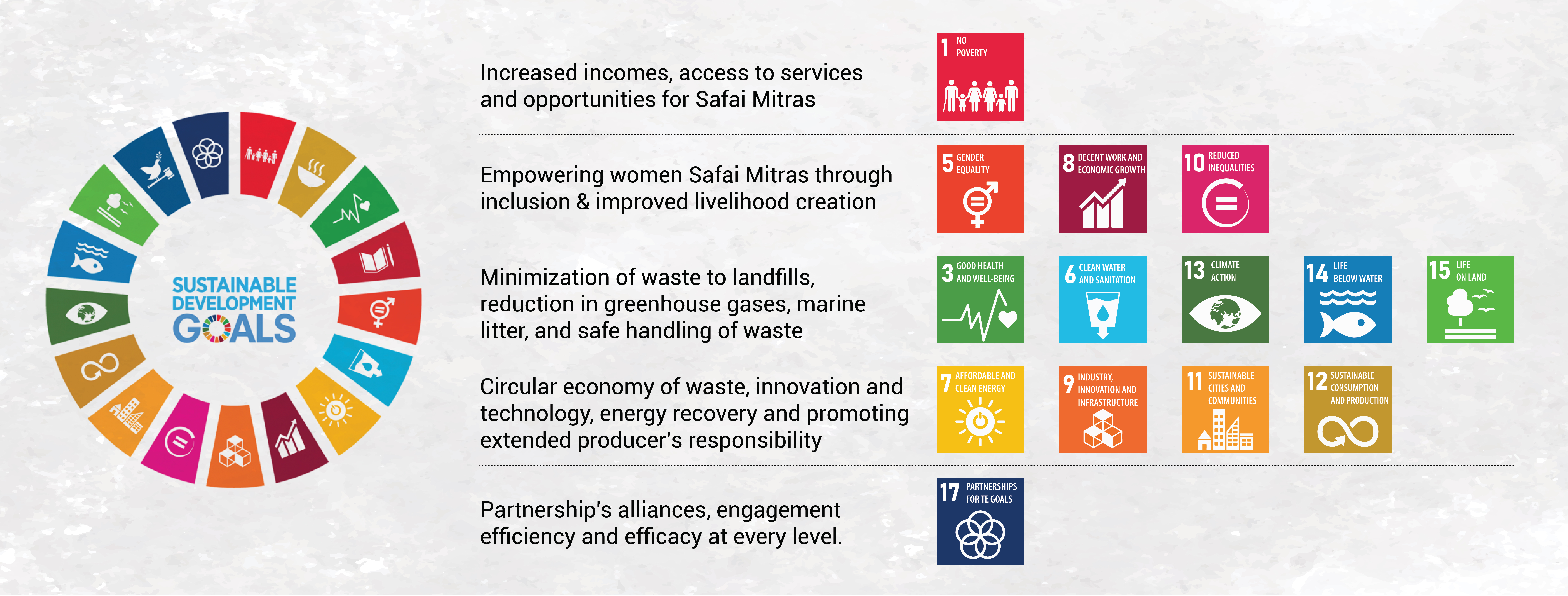
CEE Engagement with Ministry of Jal Shakti
CEE is National Thematic Lead for Plastic Waste Management & State Lead for Goa, Gujarat, Odisha under Ministry of Jal Shakti Rural Wash Partner’s Forum. From the start until May 2024, our project team has made nearly 86 presentations at national and international forums, sharing lessons, challenges, processes and best practices.
Mr. Prabhjot Sodhi, Sr. Program Director (Circular Economy) along with CEE team has provided need-based training sessions, to various states including Punjab, Chhattisgarh, Rajasthan, Odisha, Gujarat, Telangana, Jharkhand, Assam on Plastic Waste Management, Material Recovery Facility, Circular Economy. Team conducted sessions on the use of plastic waste in road construction; monitoring and reporting systems for traceability at SPM Niwas Kolkata. CEE has provided guidance & shared with state Swachh Bharat Mission-Grameen of Bihar, Punjab, Chhattisgarh, Jharkhand, Gujarat, Odisha, Goa. CEE has given presentations on the real-time monitoring systems and reporting formats that has been developed under HDFC Bank-CEE project to the National level team in the Ministry of Jal Shakti. Best practices of social mapping with communities resulting in more trust-worthy relationships, mutual agreements for taking responsibilities in the plastics ecosystem.
Funding Organisation
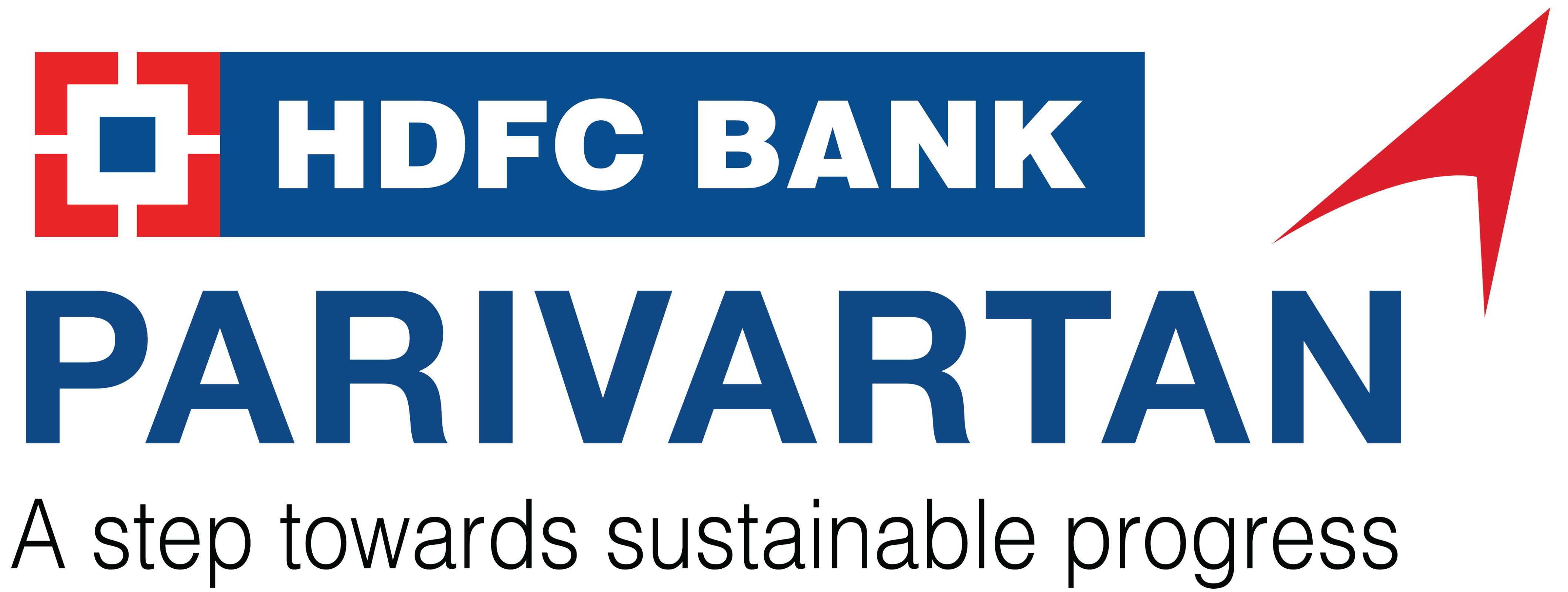
Contacts
Delhi Office
Prabhjot Sodhi
Senior Programme Director
[email protected]
Rohit Maskara
Project Manager
[email protected]
Established as a Centre of Excellence of the Ministry of Environment, Forest & Climate Change, Government of India.